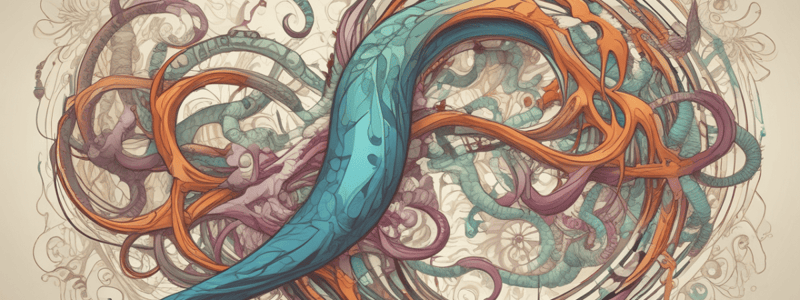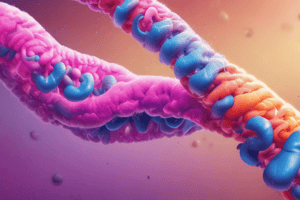Podcast
Questions and Answers
What is the primary distinction between inherited variations and acquired variations?
What is the primary distinction between inherited variations and acquired variations?
- Acquired variations are not passed to offspring. (correct)
- Inherited variations are always beneficial.
- Acquired variations are caused by genetic mutations.
- Inherited variations result from environmental factors.
Which of the following mutations is specifically the result of a change in a single gene?
Which of the following mutations is specifically the result of a change in a single gene?
- Point mutation (correct)
- Chromosome mutation
- Deletion mutation
- Translocation mutation
Which statement best describes the role of mutagens?
Which statement best describes the role of mutagens?
- Mutagens are mutations that occur spontaneously.
- Mutagens prevent mutations from occurring.
- Mutagens are variations inherited from parents.
- Mutagens are agents that can cause mutations. (correct)
How does evolution primarily occur in species over time?
How does evolution primarily occur in species over time?
What characterizes a chromosome mutation?
What characterizes a chromosome mutation?
Which individuals are credited with proposing the theory of evolution?
Which individuals are credited with proposing the theory of evolution?
Which type of variation is learned through experiences rather than inherited?
Which type of variation is learned through experiences rather than inherited?
Which statement accurately describes mutations?
Which statement accurately describes mutations?
What is a characteristic feature of a point mutation?
What is a characteristic feature of a point mutation?
What defines a species in biological terms?
What defines a species in biological terms?
Which of the following best represents the impact of meiosis on variation?
Which of the following best represents the impact of meiosis on variation?
What is the effect of a mutagen?
What is the effect of a mutagen?
What distinguishes a chromosome mutation from other types of mutations?
What distinguishes a chromosome mutation from other types of mutations?
Which type of variation is influenced directly by the genetic information passed from parents during reproduction?
Which type of variation is influenced directly by the genetic information passed from parents during reproduction?
What is the primary effect of a point mutation on an organism's DNA?
What is the primary effect of a point mutation on an organism's DNA?
Which factor is a source of variation that contributes to genetic diversity in species over generations?
Which factor is a source of variation that contributes to genetic diversity in species over generations?
Which of the following best describes the role of mutations in the process of evolution?
Which of the following best describes the role of mutations in the process of evolution?
What distinguishes a mutagen from other agents that cause genetic change?
What distinguishes a mutagen from other agents that cause genetic change?
Which explanation best describes the concept of evolution?
Which explanation best describes the concept of evolution?
Which disorder is an example of a chromosome mutation?
Which disorder is an example of a chromosome mutation?
Flashcards
Inherited Variation
Inherited Variation
Traits passed from parents through reproduction.
Acquired Variation
Acquired Variation
Traits from life experiences.
Mutation
Mutation
DNA change, creating new genes.
Point Mutation
Point Mutation
Signup and view all the flashcards
Chromosome Mutation
Chromosome Mutation
Signup and view all the flashcards
Mutagens
Mutagens
Signup and view all the flashcards
Evolution
Evolution
Signup and view all the flashcards
Species
Species
Signup and view all the flashcards
Sources of Variation
Sources of Variation
Signup and view all the flashcards
Theory of Evolution
Theory of Evolution
Signup and view all the flashcards
Variation
Variation
Signup and view all the flashcards
Meiosis
Meiosis
Signup and view all the flashcards
Sexual Reproduction
Sexual Reproduction
Signup and view all the flashcards
DNA
DNA
Signup and view all the flashcards
Genes
Genes
Signup and view all the flashcards
Charles Darwin and Alfred Wallace
Charles Darwin and Alfred Wallace
Signup and view all the flashcards
Down Syndrome
Down Syndrome
Signup and view all the flashcards
Sickle cell anemia
Sickle cell anemia
Signup and view all the flashcards
Genetic material
Genetic material
Signup and view all the flashcards
Study Notes
Variations
- Variations refer to different characteristics within the same species.
Inherited Variations
- Inherited variations are traits passed down from parents through sexual reproduction.
Acquired Variations
- Acquired variations result from experiences and environmental factors throughout an individual's life.
Sources of Variation
- Key sources of variation include meiosis and sexual reproduction.
Mutations
- Mutations are alterations in DNA structure or quantity that can introduce new genes to a population, potentially leading to beneficial or harmful traits.
Mutagens
- Mutagens are agents or substances that trigger mutations in the genetic material.
Point Mutation
- A point mutation is a specific change in a gene, exemplified by conditions like sickle cell anemia.
Chromosome Mutation
- Chromosome mutations involve changes in the structure or number of chromosomes, as seen in disorders like Down syndrome.
Evolution
- Evolution is defined as the inheritable genetic change in a species over extended periods, driven by environmental changes.
Species
- A species is a collection of similar organisms that can reproduce and produce fertile offspring.
Theory of Evolution
- The theory of evolution was proposed by naturalists Charles Darwin and Alfred Wallace.
Variations
- Variations refer to different characteristics within the same species.
Inherited Variations
- Inherited variations are traits passed down from parents through sexual reproduction.
Acquired Variations
- Acquired variations result from experiences and environmental factors throughout an individual's life.
Sources of Variation
- Key sources of variation include meiosis and sexual reproduction.
Mutations
- Mutations are alterations in DNA structure or quantity that can introduce new genes to a population, potentially leading to beneficial or harmful traits.
Mutagens
- Mutagens are agents or substances that trigger mutations in the genetic material.
Point Mutation
- A point mutation is a specific change in a gene, exemplified by conditions like sickle cell anemia.
Chromosome Mutation
- Chromosome mutations involve changes in the structure or number of chromosomes, as seen in disorders like Down syndrome.
Evolution
- Evolution is defined as the inheritable genetic change in a species over extended periods, driven by environmental changes.
Species
- A species is a collection of similar organisms that can reproduce and produce fertile offspring.
Theory of Evolution
- The theory of evolution was proposed by naturalists Charles Darwin and Alfred Wallace.
Variations
- Variations refer to different characteristics within the same species.
Inherited Variations
- Inherited variations are traits passed down from parents through sexual reproduction.
Acquired Variations
- Acquired variations result from experiences and environmental factors throughout an individual's life.
Sources of Variation
- Key sources of variation include meiosis and sexual reproduction.
Mutations
- Mutations are alterations in DNA structure or quantity that can introduce new genes to a population, potentially leading to beneficial or harmful traits.
Mutagens
- Mutagens are agents or substances that trigger mutations in the genetic material.
Point Mutation
- A point mutation is a specific change in a gene, exemplified by conditions like sickle cell anemia.
Chromosome Mutation
- Chromosome mutations involve changes in the structure or number of chromosomes, as seen in disorders like Down syndrome.
Evolution
- Evolution is defined as the inheritable genetic change in a species over extended periods, driven by environmental changes.
Species
- A species is a collection of similar organisms that can reproduce and produce fertile offspring.
Theory of Evolution
- The theory of evolution was proposed by naturalists Charles Darwin and Alfred Wallace.
Studying That Suits You
Use AI to generate personalized quizzes and flashcards to suit your learning preferences.



